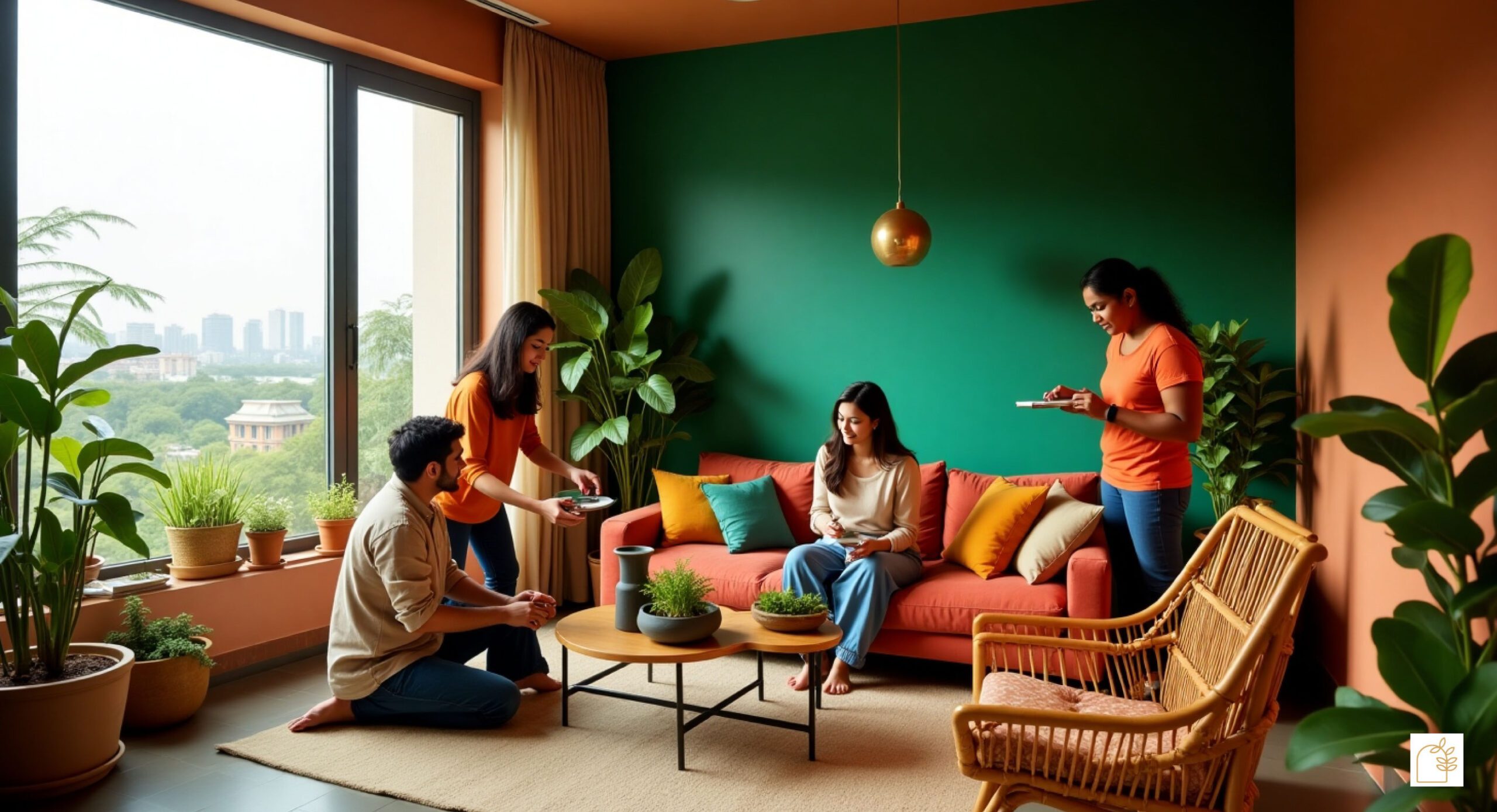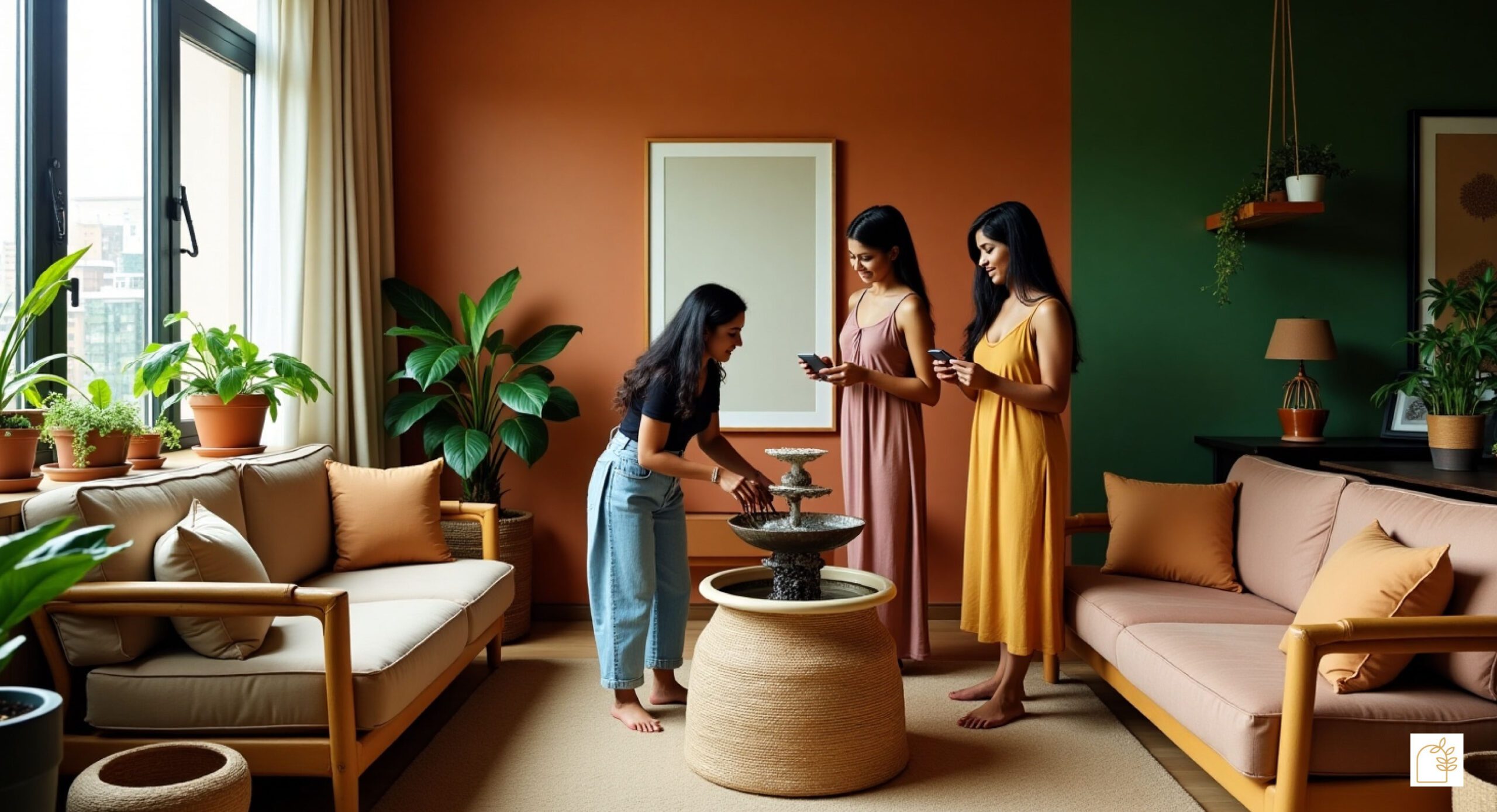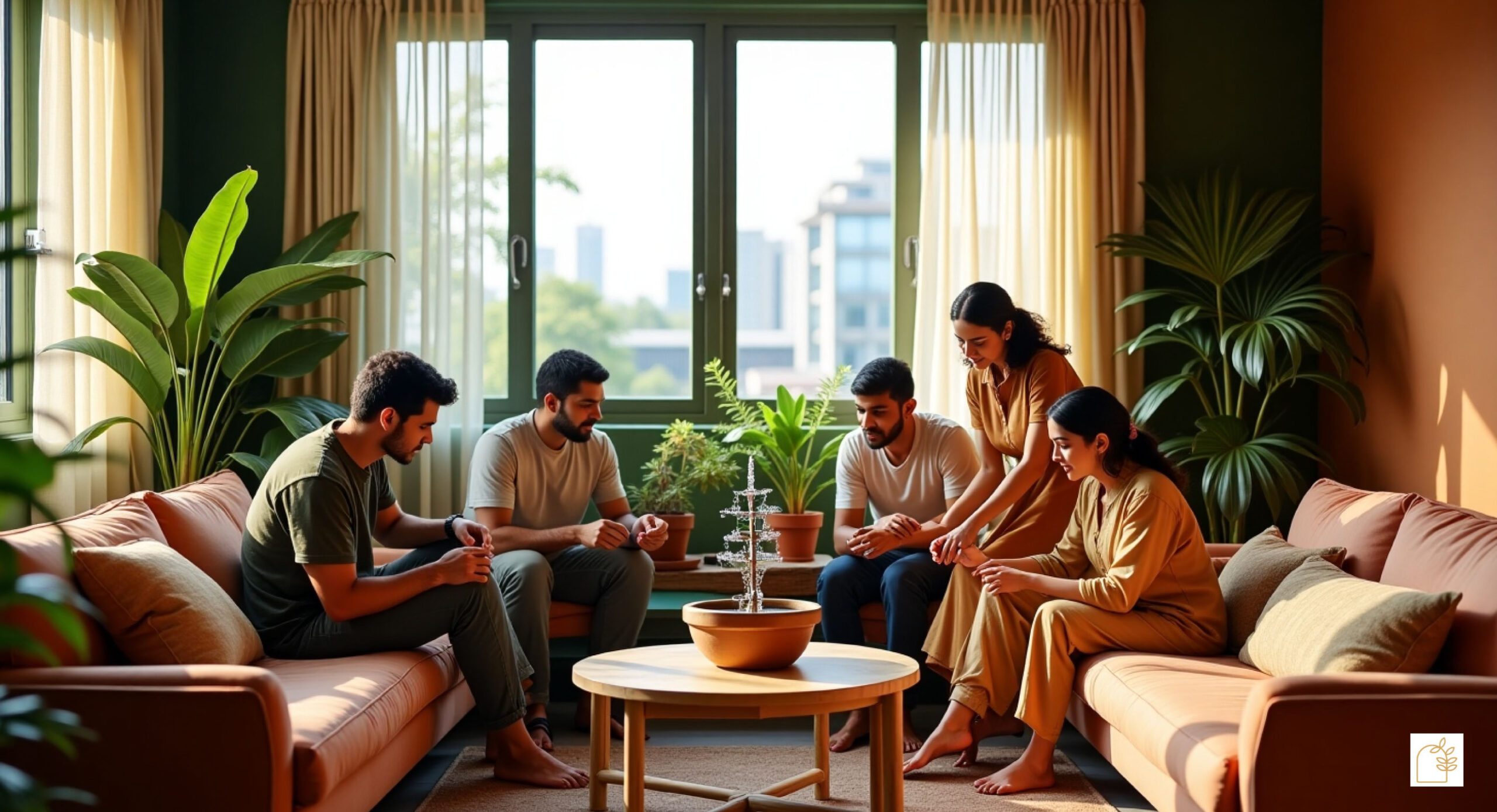In 2025, integrating natural elements into interior design is transforming Indian homes, blending aesthetics with sustainability in a $150 billion real estate market (Inc42, 2024). With 60.4% of India’s population digitally connected (RBI, 2024) and 70% of homeowners prioritizing eco-friendly spaces (Knight Frank, 2024), biophilic design enhances well-being and aligns with India’s 3,500 IGBC-certified green projects (FICCI, 2024). As urban congestion costs ₹1.47 lakh crore annually (Economic Times, 2024) and the home decor market grows at 15% CAGR (IBEF, 2024), natural elements offer affordable, stylish solutions for compact urban homes.
Why Integrating Natural Elements Matters in 2025

Biophilic design, which incorporates nature into interiors, boosts mental health by 20% and productivity by 15% in urban homes, where space averages 500–800 sq ft (Financial Express, 2024; Economic Times, 2024). With 500 million social media users sharing decor inspiration (Statista, 2025) and 50% of UPI transactions funding lifestyle upgrades (NPCI, 2024), natural elements like plants and wood align with 40% renewable energy goals (CEA, 2024). Supporting 100+ smart cities (Smart Cities Mission, 2025), these designs reduce reliance on artificial materials, saving ₹5,000–₹20,000 annually on energy and decor costs. From Mumbai’s high-rises to Bengaluru’s tech-savvy flats, natural elements create calming, eco-conscious homes.
As an interior design expert, I’ve transformed urban spaces with biophilic principles. This guide shares seven key tips for integrating natural elements into Indian interiors in 2025, with actionable advice for implementation.
Tips for Integrating Natural Elements
1. Incorporate Indoor Plants
Low-maintenance plants like snake plants or pothos, costing ₹200–₹1,000, improve air quality by 25% (Pepperfry, 2025). In Delhi, 60% of homes use plants to enhance aesthetics (Knight Frank, 2024).
Actionable Tip: Shop plants at ugaoo.com.
2. Use Natural Materials
Wood, bamboo, or jute furniture, priced ₹5,000–₹30,000, adds warmth and sustainability (Urban Ladder, 2025). In Bengaluru, bamboo decor supports 3,500 green projects (FICCI, 2024).
Actionable Tip: Explore wooden furniture at urbanladder.com.
3. Maximize Natural Light
Large windows or sheer curtains, costing ₹1,000–₹5,000, increase light by 30%, reducing energy costs (Economic Times, 2024). In Mumbai, light-enhancing designs suit 60.4% digital residents (RBI, 2024).
Actionable Tip: Buy curtains at homecentre.in.
4. Add Water Features
Tabletop fountains or aquariums, priced ₹2,000–₹10,000, create calming vibes, reducing stress by 15% (Financial Express, 2024). In Chennai, water features enhance smart city homes (Smart Cities Mission, 2025).
Actionable Tip: Shop fountains at amazon.in.
5. Use Earthy Color Palettes

Green, beige, or terracotta paints, costing ₹500–₹2,000 per liter, make rooms feel 20% larger (Asian Paints, 2025). In Hyderabad, earthy tones align with eco-conscious living (CEA, 2024).
Actionable Tip: Choose colors at asianpaints.com.
6. Incorporate Natural Textures
Cotton, linen, or rattan textiles, priced ₹1,000–₹5,000, add tactile comfort (Pepperfry, 2025). In Pune, textures resonate with 500 million social media users sharing decor ideas (Statista, 2025).
Actionable Tip: Buy textiles at fabindia.com.
7. Create Green Walls
Vertical gardens, costing ₹5,000–₹15,000, save 25% of space and purify air (The Hindu, 2024). In Ahmedabad, green walls support $1 trillion e-commerce lifestyles (Economic Times, 2024).
Actionable Tip: Explore green walls at ugaoo.com.
Natural Elements Integration Table 2025
| Design Tip | Cost (₹) | Key Benefits | Impact in India |
|---|---|---|---|
| Indoor Plants | 200–1,000 | Improves air quality by 25% | Enhances Delhi home aesthetics |
| Natural Materials | 5,000–30,000 | Adds sustainable warmth | Supports Bengaluru green projects |
| Natural Light | 1,000–5,000 | Saves 30% energy costs | Suits Mumbai urban homes |
| Water Features | 2,000–10,000 | Reduces stress by 15% | Enhances Chennai smart city flats |
| Earthy Color Palettes | 500–2,000/liter | Makes rooms feel 20% larger | Aligns with Hyderabad eco-goals |
| Natural Textures | 1,000–5,000 | Adds tactile comfort | Appeals to Pune social media users |
| Green Walls | 5,000–15,000 | Saves 25% space, purifies air | Supports Ahmedabad e-commerce homes |
Applications of Natural Elements in Indian Interiors
- Urban Living: Enhances comfort for 60.4% digital residents in metro cities (RBI, 2024).
- MSMEs: Creates inspiring workspaces for 63 million small businesses (MSME Ministry, 2024).
- Smart Cities: Supports sustainable design in 100+ urban projects (Smart Cities Mission, 2025).
- Sustainability: Aligns with 3,500 green projects through eco-materials (FICCI, 2024).
- Content Creation: Inspires decor vlogs for 500 million social media users (Statista, 2025).
Actionable Tip: Start with indoor plants from ugaoo.com for an easy biophilic touch.
Benefits of Integrating Natural Elements
- Well-Being: Boosts mental health by 20% (Financial Express, 2024).
- Energy Savings: Cuts costs by 30% with natural light (Economic Times, 2024).
- Space Optimization: Makes rooms feel 20% larger (Asian Paints, 2025).
- Sustainability: Supports 40% renewable energy goals with eco-materials (CEA, 2024).
Actionable Tip: Use bamboo furniture for affordable, sustainable style.
